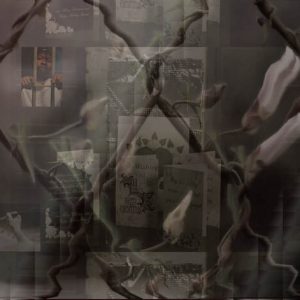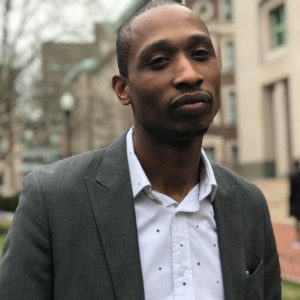Pastor Isaac Scott spent more than a decade behind bars before becoming a multi-media visual artist and starting The Confined Arts, an organization that aims to use art for systemic change around incarceration. The group came together when Scott entered the Justice and Education Scholars program at Columbia University, but it was his incarceration that gave rise to a passion for drawing, oil painting, and activism.
“The Confined Arts came out of my own work as a visual artist and coming home with art and not really having a home for it,” said Scott. “Not being able to display the art, to show it, and to really exhibit my own talent. So [I decided] to make a space for myself and for other artists just like me.”
They had their first exhibition on 125th Street in Harlem. It featured work by activists against mass incarceration, and by artists who were both formerly incarcerated and still on the inside. But the project really started to take shape when Scott started the scholars program.
“This is something that has more of a purpose,” said Scott. “We hope to achieve everything from systemic change to [creating] more humanizing narratives about people, and not just people in the criminal justice system, even though that’s our primary target. We understand the power that the arts can have, and we want to make sure we can use the arts in every capacity to change hearts and minds.”
Pastor Scott dropped out of high school, and was in and out of prison for many years.
 “It was a lot of back and forth, going to jail and coming home for small drug-related crimes,” he said. “Smoking weed…selling crack cocaine.”
“It was a lot of back and forth, going to jail and coming home for small drug-related crimes,” he said. “Smoking weed…selling crack cocaine.”
In between arrests, Scott got his GED and an associates degree in computer networking. After graduating, though, he found providing for his family challenging.
“I felt a lot of pressure from life, having kids and not being able to find a job immediately,” said Scott. “And I went back into the streets, and when I went back the stakes were a lot higher, I got in a lot deeper. I ended up getting a lot more time when I went back to prison, nine years.”
In his last few years in prison, Pastor Scott became an inmate grievance representative, meaning he acted as a sort of mediator between those incarcerated and the prison administration. This is where Scott’s passion for advocacy began.
“It was an advocacy position, a position where I could actually make change in the facility, and help some of the brothers who had formal complaints,” he said.
There were plenty of complaints. Prison isn’t a pleasant place. But Pastor Scott stressed that prison isn’t like the movies. The most challenging parts of it usually have to do with the prison administration.
“I can’t say I had more trouble with the people I was doing time with than I did with the administration,” said Scott. “When I say that prison was oppressive, it wasn’t because of the brothers that I lived with. It was because of the system and how they made everything so hard. When you went to them for a little bit of help they were dismissive and mean to you because you were in prison.”
People were threatened out of making complaints, according to Scott. Police came into cells and flipped them upside down looking for contraband. Sometimes people wouldn’t get their packages just because someone in the delivery room wasn’t feeling generous that day.

“I can give you a hundred stories about how the police did things that were violent,” he said. “When I was incarcerated at 18, me and another gentleman got into a physical altercation. We were young, we were teenagers. [Two police officers] put us between their security gates, made us stand on our knees, and practiced karate moves on us. The way they treated you showed that you were not worthy of respect. That makes life hard. You don’t own yourself, so everything about you is subject to the state’s approval.”
But Pastor Scott’s time in prison wasn’t solely defined by these challenging moments. He started drawing while incarcerated, and spent time making greeting cards.
“It provided me with a psychological means to deal with incarceration,” said Scott. “Art did save my life in a lot of ways.”
Pastor Scott was also baptized in prison. He was “saved” at the Five Points Correctional Facility in 2008, and two years ago he was ordained. His faith acted as a stable rock for most of his sentence.
Now Scott believes he’s come into his own as a faith leader and an activist.

The Confined Arts is a means for him to change minds and attitudes surrounding incarceration. Pastor Scott is an abolitionist and holds strong views about the criminal justice system.
“Prisons are an evolution of the slave system,” he said. “We’re still holding people as property in America. I believe if we took a preventative approach to incarceration we would be able to do away with the prison system. If we were medically preventative, socially preventative, economically preventative, then folks wouldn’t find themselves in these situations. Some crimes come out of poverty, some crimes come out of domestic issues. If there were more social support mechanisms in place then you would be able to intervene quicker than the police do.”
Beyond changing minds, Scott wants to change the Constitution. The 13th Amendment bars slavery in every circumstance except for as punishment for a criminal offense.
“There is no abolition without amending the Constitution, because it still says slavery is acceptable under the 13th Amendment,” said Scott. “It’s still written into the fabric of this country. Until we attack that, we’re not really talking about anything.”


